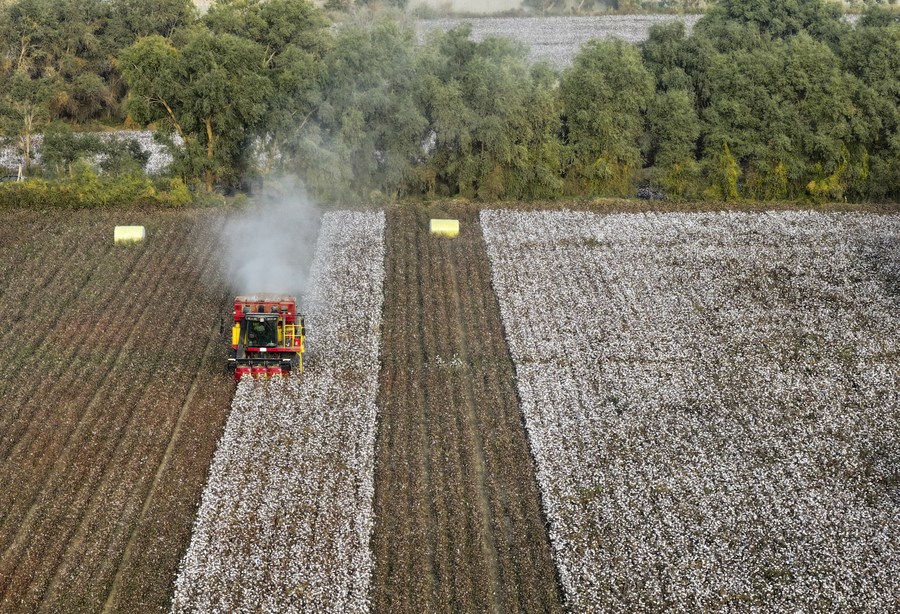
This aerial photo taken on Oct. 20, 2023 shows a harvester working at a cotton field in Weili County, Bayingolin Mongolian Autonomous Prefecture, northwest China's Xinjiang Uygur Autonomous Region. (Xinhua/Wang Fei)
Such nonsense as "forced labor" and "cultural genocide" is fabricated by Western media purely out of political interests.
URUMQI, Dec.22, 2023 -- Experts from China's Xinjiang Uygur Autonomous Region and other provinces on Wednesday rejected propaganda by Western governments, media outlets and think tanks against human rights development in Xinjiang, a region in northwestern China.
In a seminar on the sidelines of an idea- and story-sharing conference held here, the experts said that the West, especially the United States, has double standards on terrorism and human rights issues while turning a blind eye to Xinjiang's social-economic development as well as the protection of human rights.
Zhu Liyu, a professor at the Human Rights Center of Renmin University of China, said that the U.S. government collaborates with the private sector to profit off private prisons, where prisoners are effectively treated as slaves.
The U.S. media outlets seldom report on the suffering of prisoners in private prisons but spare no efforts to hype up the so-called "forced labor" issue in Xinjiang, Zhu said. "The so-called 'Uyghur Forced Labor Prevention Act' aims to disrupt the sale of cotton and other products from Xinjiang, so that they can sell their products," the professor said.
Batur Barat, head of the music school of Xinjiang Normal University, said that the central government has been preserving and promoting traditional Uygur Muqam music since the 1960s, adding that many Muqam music groups have been formed and perform across the world.
The Uygur Muqam of Xinjiang was added to the United Nations Educational, Scientific and Cultural Organization list of the Masterpieces of the Oral and Intangible Heritage of Humanity in 2005. "If the government had adopted 'cultural genocide' like the West reports, how could Muqam survive and be inherited by us?" said Barat.
By overemphasizing individuals' right to freedom, the Western view on human rights disregards the role of the government, which sometimes leads to the loss of individual dignity like the drug issue in the United States, said Bai Fan, an associate researcher with the Chinese Academy of Social Sciences.
On the international level, Bai said the issue of human rights is always linked to aid from the West and serves as an excuse to interfere in other countries' internal affairs.
"U.S. manipulation of Xinjiang-related issues is a ridiculous 'blockbuster' (film) in which the U.S. government acts as the producer and director at once," said Xu Qiqi, an associate researcher with the Academy of Contemporary China and World Studies, a think tank affiliated to the China International Communications Group.
He exposed the tricks favored by U.S. and other Western media in their relentless smear campaign against Xinjiang, such as churning out bare-faced lies on social media and magnifying the disastrous effects with the help of artificial intelligence, adding the West also used the Group of Seven to throw mud at Xinjiang's human rights cause.
Such nonsense as "forced labor" and "cultural genocide" is fabricated by Western media purely out of political interests, said Qian Jinyu, a professor who specializes in human rights at Guangdong University of Technology.
Qian denounced the "three forces" of terrorism, separatism and extremism which have sowed the seeds of instability in Xinjiang. "The criteria for assessing the achievements of Xinjiang's cause of human rights can by no means solely rely on the desires and prejudices of foreign countries. People of Xinjiang have the final say," he said.
The conference on Wednesday was themed "promoting the high-quality development of the human rights cause in Xinjiang within the Chinese modernization drive," and attended by over 70 experts from universities, think tanks and research institutes nationwide.
A report on Xinjiang's human rights and legal protections, compiled by Xinjiang University and the Southwest University of Political Science and Law, was also issued at the event.


